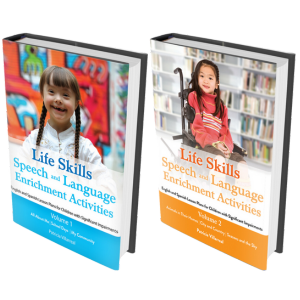How timely, that at the beginning of the school year, I was reminded of why I choose to work as a speech-language pathologist. My reminder arrived just a few days ago in a simple and beautiful way while I worked with a child with autism and his family. I was able to facilitate this child’s communication with his family using a device, and he seemed motivated to communicate with them and in turn, his family became more motivated to communicate with him. As a result, the communication within this family grew stronger. What I just described prompted me to watch the documentary, Wretches and Jabberers, for a second time.  How grateful I am that I was there to witness this breakthrough and progress!
How grateful I am that I was there to witness this breakthrough and progress!
Autism hits the Big Screen
The first time I watched the documentary, I was in awe of the profound comments and questions that were discussed, and once again, tears came to my eyes while I watched these complex adults interact with each other and the adults who selflessly support them. In the documentary, Tracy and Larry, advocates and artists respectively, embark on a journey to Sri Lanka, Japan, and Finland to meet with other adults with autism and hold conferences to share their ideas by slowly typing insightful comments and often unanticipated poetry. Ultimately, this group shattered misconceptions about autism and inspired all who crossed their paths. They demonstrated such persistence to communicate and reminded me that as a speech therapist and in my life in general, I want to grab hold of and live out that persistence every day.
So… the beginning of the school year is the perfect time to remind yourself of the unique reasons that motivate you to help others communicate. I urge you to write them down and look at them periodically for encouragement and perspective. I also challenge you this school year to be persistent in all of your endeavors. Learn from the communicative persistence of individuals you interact with and let that persistence flourish in your own life.
Informal Autism Assessments
We have also added some formal and informal assessment tools in addition to books to help you plan intervention for individuals with autism. We hope this list provides you with guidance and a variety of options to gather meaningful information for your assessments and intervention plans.
- MacArthur Communication Developmental Inventory for Words and Gestures or Words and Sentences
- Social Language Development Test-Elementary (ages 6-11)
- Social Language Development Test Adolescent (ages 12-17)
- Pragmatics section of the Comprehensive Assessment of Social Language (CASL)
- Autism Diagnostic Observation Schedule (ADOS)- standardized scores available for English speakers
- Communication and Symbolic Behavior Scales (CSBS) – helpful when identifying behaviors consistent with ASD
- SCERTS Assessment Process – helpful in program planning and for tracking student progress
- Communication Matrix: free of charge through the Oregon Health & Science University’s Design to Learn Projects at www.matrizdecomunicacion.org; available in English, Spanish, Chinese, Russian, Korean, and Vietnamese
- Michelle Garcia-Winner’s Social Thinking assessment– covers theory of mind (thinking with your eyes), dynamic conversation, humor, sequencing (in relation to conversation and social interaction)
- Every Move Counts, Clicks and Chats – a multidisciplinary informal assessment tool; a sensory based approach to communication and assistive technology for individuals with significant sensory motor differences, developmental differences, and autism.
Books for Intervention Planning
The Comprehensive Autism Planning System [CAPS] for Individuals with Asperger Syndrome, Autism, and Related Disabilities- helps educators implement an instructional program for students with ASD
The Ziggurat model: A Framework for Designing Comprehensive Interventions for Individuals with High-Functioning Autism and Asperger Syndrome
Watch Movie Trailer(www.wretchesandjabberers.org)
Written by Carolyn Gutierrez, M.A., CCC-SLP



